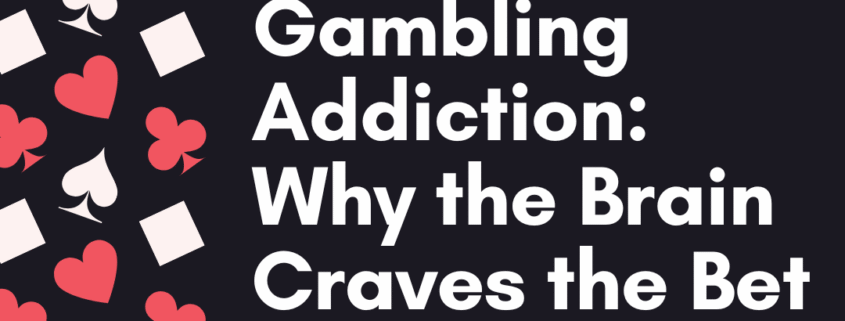The Psychology of Gambling Addiction: Why the Brain Craves the Bet
Author: Sam DeFilippo, MS, LPC, NCC, CAADC
For many, gambling starts out as a harmless thrill, a scratch-off ticket here, a poker night there, or the occasional spin of an online slot machine. But for others, that excitement can spiral into a relentless cycle that feels impossible to break. Gambling addiction, also known as compulsive gambling or gambling disorder, isn’t simply about poor decision-making or lack of willpower. It’s deeply rooted in the way our brains process rewards, risk, and uncertainty.
The Brain on a Bet
At the heart of gambling addiction is the brain’s reward system, the same system involved in drug addiction, overeating, and other compulsive behaviors. When someone places a bet and wins (or almost wins), the brain releases dopamine, a chemical that signals pleasure and reinforces behaviors that lead to rewards.
But here’s where it gets tricky: studies show that gambling triggers dopamine release at higher levels than natural rewards like food or social connection. Even more surprising, “near misses” those moments when a gambler just barely loses, can activate the brain’s reward circuitry almost as strongly as an actual win. This keeps people coming back, hoping that the next bet will finally pay off.
Variable Rewards: The Hook of Uncertainty
One of the most powerful psychological mechanisms behind gambling addiction is something called “intermittent reinforcement.” Unlike predictable rewards e.g. earning a paycheck every two weeks), gambling offers rewards at random intervals. This unpredictability makes the behavior incredibly compelling and hard to walk away from.
It’s the same concept that keeps us refreshing our phones or checking social media we never know when the next dopamine hit is coming. In gambling, this uncertainty creates a loop where the brain becomes hyper-focused on chasing the next win, regardless of the losses piling up along the way.
Tolerance, Cravings, and Loss of Control
As with other addictions, the brain can develop a tolerance to gambling. What once felt exciting now requires bigger risks or more frequent bets to achieve the same high. Over time, people may gamble to escape stress, boredom, or emotional pain, rather than for enjoyment. At this point, gambling is no longer about winning , it’s about relief from uncomfortable feelings.
Many people with gambling addiction report being in a kind of trance during binges, where rational thinking is replaced by a tunnel vision focused on the next bet. This “zoning out” is part of the psychological cycle that makes it hard to stop, even when losses are mounting and consequences are severe.
Who’s Most at Risk?
While anyone can develop a gambling problem, certain factors increase the risk:
- Mental health challenges, such as depression and anxiety
- History of trauma or abuse
- High levels of stress or isolation
- Early exposure to gambling, especially in adolescence
- Easy access to online or mobile gambling platforms
In addition to traditional gambling, online gambling raises the risk for certain groups, including:
Young adults and teens, who are already heavy digital users
Individuals with a history of addiction, including to alcohol or substances
Those facing financial stress or isolation
What Can Help?
Understanding the psychology behind gambling addiction is a key step in breaking free from its grip. Effective treatment often includes:
Cognitive-behavioral therapy (CBT), which helps people challenge distorted beliefs about gambling (“I’m due for a win,” “I can make it back”)
Support groups, like Gamblers Anonymous, which offer community and accountability
Financial counseling, to help address the practical fallout of gambling-related debt
Mindfulness and emotion regulation skills, which can reduce impulsive urges
Recovery isn’t about never feeling tempted again, it’s about learning how to respond differently when those urges arise.
Equilibria is a group of licensed mental health professionals in Pennsylvania and New Jersey with multiple specialties to serve all aspects of our diverse community’s mental, emotional, and behavioral needs. We provide in person and telehealth services to individuals of all ages, families, and those in relationships. Click here to schedule an appointment today.






